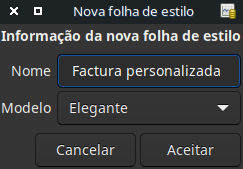
opt/gnome/share/gnucash/guile-modules/gnucash/report var/lib/flatpak/app//current/active/files/share/guile/site/2.2/gnucash/reports usr/share/gnucash/guile-modules/gnucash/reportĭebian with flatpak including derivatives such as Ubuntu

usr/local/share/gnucash/guile-modules/gnucash/reportĭebian including derivatives such as Ubuntu usr/local/share/gnucash/scm/gnucash/report usr/local/share/guile/site//gnucash/reports The location of existing reports varies with by operating systems:
↑ Up to GnuCash 4.0 this was ( _ "Some Text" ). GNUCASH INVOICE STYLESHEETS CODE
See I18N#How to make strings in code translatable for details. ( G_ "Some Text" ), ( N_ "Some Text" ) and similar mark the text for translation. That is the tool which makes the strings translatable. This should be good motivation to go and tackle the learning curve for Scheme. You don't need this for writing the reports themselves, but it gives a clue of how reports are created in GnuCash. Guile is used internally by GnuCash to interpret the Scheme reports. For anything more than this tutorial you should, at least, have gone through the Getting Started section. If you are new to Scheme it is not necessary to read and understand all of it right now.
Mastering Scheme is much easier if you've read The Scheme Programming Language by R. This tutorial is self-contained but to extend it in reports you'll want to use the following references and learn about the language. For a quick introduction try Learn Scheme in 15 minutes using an online scheme repl. GnuCash reports are written in the Scheme programming language. This tutorial will give you an overview of GnuCash reports and might give you the confidence to make simple changes to existing reports. And finally, this Wiki page will give you some guidance when starting this venture. Secondly, there is a simple hello-world.scm example report specifically written to show you the base layout of a GnuCash report. Still reading? Not yet discouraged? Good for you! Thankfully, lots of help is available.įirst of all, there is good educational material available on the web to help you learn Scheme and Guile. Last, but not least, the API for that sort of thing is not formally specified. Again, if not already familiar with it, this is the second piece of work that one has to swallow. Guile is used as interface to get the Scheme code executed during runtime. The obvious drawback is that one must learn yet another programming language (if not already familiar with it) but saves the effort of having to alter and build GnuCash's source code. Learning Scheme is one of the prerequisites to create new reports. In the GnuCash project the reports are coded in Scheme, not in C. However, there is no official documentation. This wiki page should contain some information to help you get started. 
Unfortunately, at the present time writing a custom report for GnuCash requires a little bit of hacking. If you are ready for coding (and even already firm in Scheme and Guile) then this is the place to contribute. Possibly there are ways to get what you desire without coding. If you are not up for coding, you should check the
Reports written in the Scheme programming language which are not delivered as part of the standard reports (this page). Customized output format for reports ( Custom Reports Using Eguile). Combining selected standard reports into one view ( Using GnuCash#Custom Multicolumn Report). Customizing settings for standard reports ( Using GnuCash#Saved Report Configurations). The term Custom Reports has several contexts in GnuCash: 4.3 Technique to reload reports without restarting GnuCash. 3.6.2 Load the report from the installed report directory. 3.6.1 Load the report from a user account. 3.5.1.2 Define report with unique name and id. 3.5.1.1 Give report a unique symbol name.






 0 kommentar(er)
0 kommentar(er)
